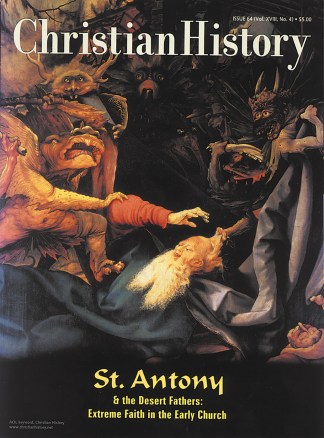Pioneer Years (251-312)
c. 251 Antony is born; Paul of Thebes begins living in the desert
c. 271 Antony takes up “the discipline,” learning from scattered Christian hermits in Egypt
c. 275 Chariton settles in Fara, becoming the first monk in Palestine
286 Antony withdraws into his fort
306 Antony emerges from his fort
c. 308 Hilarion begins ascetic life near Gaza
311 Antony visits Alexandria to comfort those persecuted by Maximin
Persecution
249-251 Decius instigates empire-wide persecution of Christians; many in Egypt flee to the desert
251 Novatian teaches that the lapsed (those who denied the faith in persecution) should not be admitted back into the church—the first sign that some Christians believe the church is becoming lax
254 Origen dies from injuries suffered in the persecution
303 The “Great Persecution” of Diocletian begins; copies of Scripture confiscated and destroyed; thousands of Christians suffer
Explosive Growth (313-357)
313 Antony withdraws to the Inner Mountain, near the Red Sea
c. 320 Pachomius founds the first monastic community, at Tabennesi
c. 330 Athanasius flees authorities, hiding with monks in the Thebaid; Amoun moves to Nitria, inspiring a monastic settlement; Marcarius the Great begins a monastery in Scetis, which grows rapidly; monasteries spring up in Palestine
338 Antony visits Alexandria and Nitria; founding of the Cells, a monastic community near Nitria
340 Athanasius, Ammonius the Tall, and Isidore visit Rome, and the monastic ideal spreads in the West
c. 350 John of Lycopolis begins his 48 years as a recluse
356 Antony dies
357 Athanasius writes his Life of Antony, which becomes a “best seller”
Toleration
313 Edict of Milan gives official toleration to Christians
325 Constantine calls for the Council of Nicea to unify church and empire; council condemns Arianism, affirms divinity of Christ
328 Athanasius becomes bishop of Alexandria
328-361 Arians control key political and ecclesiastical posts; orthodox bishops in exile
c. 340 First conversion of the Goths by (Arian) missionary Ulfilas
Second Generation (358-403)
358 Basil the Great founds his first monastery
360 Martin of Tours takes up the monastic life
383 Evagrius moves to Nitria
385 Jerome and companions found a monastery near Bethlehem; Cassian and Germanus arrive in Egypt
388 Palladius visits Alexandria, Nitria, and Cellia
391-2 Monks help destory the Temple of Sarapis in Alexandria
394 Seven monks from Jerusalem visit Egyptian monks (and will later, 405, record their journey)
399 Theophilus turns against the teachings of Origen
400 Synod at Alexandria condems Origenism; Tall Brothers and others exiled from Egypt
403 Synod of the Oak condemns Tall Brothers and John Chrysostom; exiled monks return to their monastaries
Christianization
380 Theodosius I makes Christianity the official religion of the empire
381 Council of Constantinople reaffirms Nicene Creed
386 Augustine converts after hearing about Antony
391 Theodosius I, in his Christianizing campaign, orders the closing of pagan temples
Movement Memorialized (404-500)
404 Jerome translates the Pachomian Rule into Latin
405-10 The History of the Monks of Egypt (based on the journey of 394) is completed
407-8 First devastation of Scetis by Berber tribes
419-20 Palladius writes Lausiac History, a key source for this era
420 Cassian begins writing his Institutes and Conferences
423 Simeon Stylites begins living on a pillar in Antioch, Syria
483 Sabas establishes a monastic settlement outside of Bethlehem
c. 500 Benedict of Nursia withdraws to a cave to begin the monastic life
Refining Theology
410 Alaric sacks Rome; Pelagius begins teaching salvation by good works
431 First Council of Ephesus condemns the Nestorians and affirms that Christ is one person; Pelagius is also condemned
451 Council of Chaldecon condemns monophysitism and affirms that Christ has two natures
For more information on this topic, see:
Medieval Sourcebook: Athanasius: Life of Antony, Full Text http://www.fordham.edu/halsall/basis/vita-antony.html
ATHANASIUS, St, Bishop of Alexandria http://www.ccel.org/a/athanasius/athanasius-EB.html
A Eulogy for Basil the Great http://www.sp.uconn.edu/~salomon/nyssa/basil.htm
Catholic Encyclopedia: ST. JEROME http://www.csn.net/advent/cathen/08341a.htm
St. Pachomius http://saints.catholic.org/saints/pachomius.html
Chapter 37; The Decline And Fall Of The Roman Empire http://www.ccel.org/gibbon/decline/volume1/chap37.htm
Copyright © 1999 by the author or Christianity Today/Christian History magazine. Click here for reprint information on Christian History.











